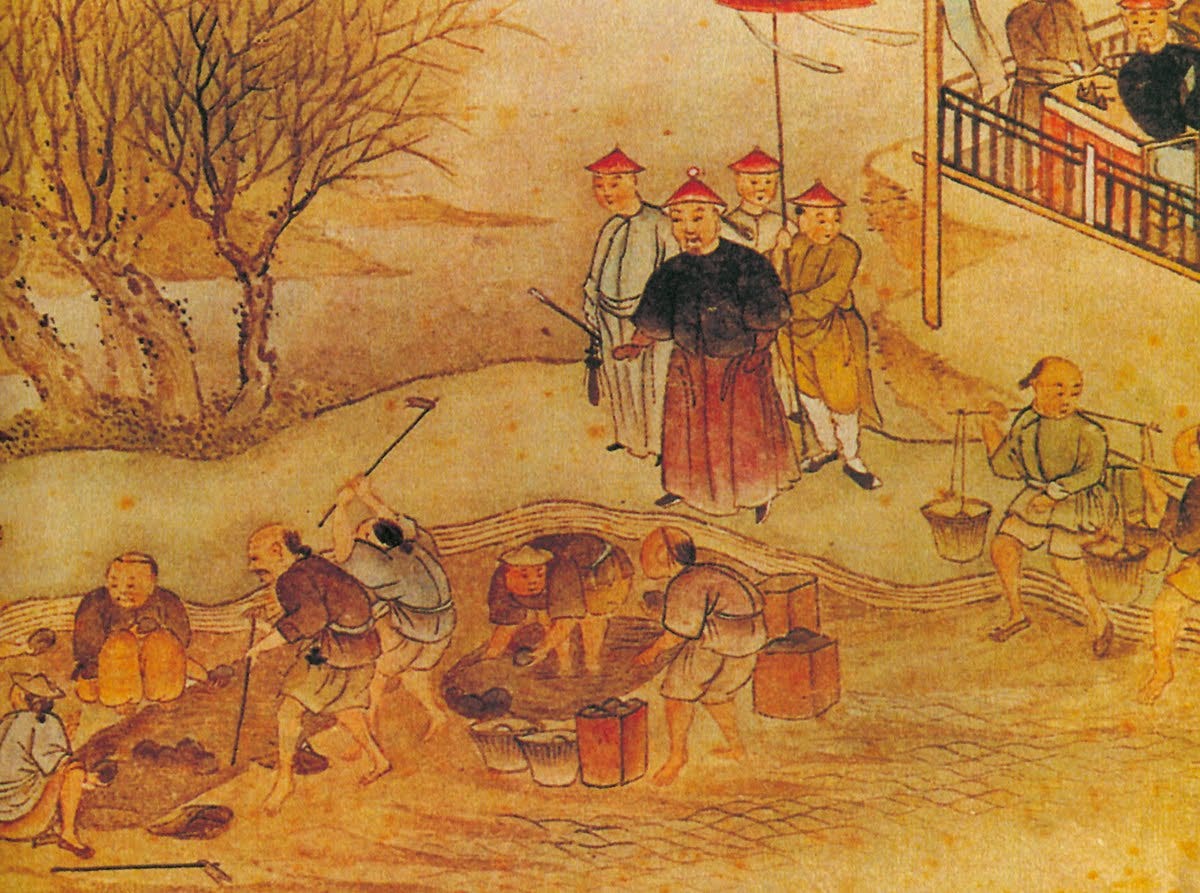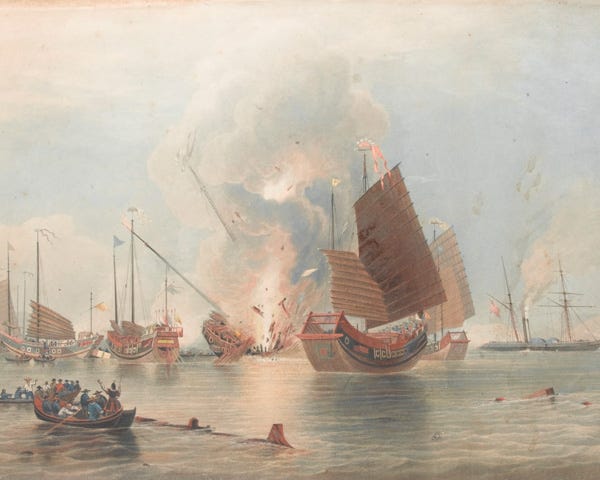
It was 1839, and the port of Canton was teeming with merchants, sailors, and the promise of trade. Yet Li Jun, a veteran tea seller, stood with dread in his heart as British warships edged closer to the shoreline. Opium had devastated his neighbourhood; his closest companion had become a wreck, his once-bright smile replaced by blackened teeth and laboured breaths. When Commissioner Lin Zexu commanded that the drug be destroyed, Li Jun prayed it would banish the misfortune that had fallen upon them. Instead, the British unleashed retribution, and the boom of cannon fire shattered every lingering hope.

While Li Jun is fictional, the crisis he witnessed was real. The First Opium War (1839–1842) erupted from a trade dispute between Britain and China. British merchants profited immensely from Chinese goods—tea, silk, porcelain—but China only accepted silver, depleting British reserves. To offset the imbalance, Britain, backed by the East India Company, flooded China with opium from India, devastating Chinese society. Addiction spread, particularly among the working class and scholars, prompting Emperor Daoguang to send Lin Zexu to crack down on the trade (L’Historie, 2020). His destruction of opium at Humen infuriated Britain, triggering military intervention.
With steam-powered gunboats, Britain quickly overwhelmed China’s outdated defences, inevitably defeating them. The Treaty of Nanking (1842), China’s first unequal treaty, imposed harsh terms:
Hong Kong ceded to Britain.
Five key ports opened to foreign trade.
Extraterritoriality, exempting British citizens from Chinese law.
Heavy indemnities paid to Britain.
This marked the beginning of China’s "Century of Humiliation" (CoH) (1839–1949)—a period of foreign domination, internal upheaval, and further losses. The Qing Dynasty’s weakness was exposed, leading to internal revolts and further Western encroachments in the decades to come.

Alison Kaufman (2011) describes the Century of Humiliation as part of a "narrative of loss and redemption that legitimises the PRC’s political system." Central to this narrative is the belief that Taiwan—viewed as the lost child—must ultimately be reunited with the motherland. This sentiment has been woven into China’s national identity, reinforcing the idea that past humiliations must be rectified. In late 2004, this stance was formally codified into law, authorising the use of “non-peaceful means” as a last resort should peaceful reunification be deemed impossible and Taiwan move toward formal independence (Cody, 2005).
I wasn’t paying attention to DeepSeek.
A month ago, I had no idea who they were. I wasn’t tracking Chinese AI companies, and wasn't thinking about whether they were catching up. If you’d asked me then, I would have told you that my main concern was about Taiwan. We had written a whole piece on it—evaluating whether Taiwan had tactically viable options to safeguard its semiconductor industry in the event of a Chinese invasion (Reason, 2023). Robert and I examined possibilities like sabotage, evacuation of key personnel, and economic deterrence—all framed around the assumption that Taiwan’s fabs were an asset worth protecting.
Then I read about DeepSeek, and for a moment, I thought: What does this update me on?
Perhaps it’s this: DeepSeek’s efficiency breakthroughs are significant. Their engineers have found ways to push models further while relying on lower-tier chips, innovating within the constraints imposed by U.S. semiconductor export controls (source). If China could produce cutting-edge AI models without top-tier chips, maybe that undermined the strategic importance of Taiwan’s semiconductor industry. Maybe the geopolitical logic around Taiwan was shifting.
Or maybe: DeepSeek’s engineering advances do not mean China needs less compute—they still need to scale up, and scaling up requires vast amounts of semiconductor power. The idea that China can match U.S. AI capabilities without high-end chips is a misreading of scaling laws. While algorithmic efficiency can shift the cost curve, the fundamental relationship between compute and AI capability remains intact—larger, more powerful models require exponentially more resources (Amodei, 2025).
Which brings us back to Taiwan.
Taiwan produces 64% of the world’s most advanced high-density logic chips (Jones, 2024). Given China’s ongoing chip deficit and the export restrictions imposed by the U.S., one might assume that PRC’s incentive to seize Taiwan’s fabs militarily has increased. If China is serious about achieving Artificial Superintelligence (or whatever term you prefer), then logically, wouldn’t taking control of the world’s most voluminous and advanced semiconductor fabs be the fastest path forward?
That was my initial instinct. But I no longer think that argument holds. Because once war starts, the fabs are gone (Sacks, 2023).
Even if China successfully occupied Taiwan, it wouldn’t mean they could use the fabs. Taiwan’s semiconductor industry is not a self-contained asset—its survival depends on global supply chains, Western intellectual property, and continued access to foreign-made tools like ASML’s extreme ultraviolet (EUV) lithography machines. The second an invasion begins, the U.S., the Netherlands, and Japan would likely cut off all technological support (Bloomberg, 2024). TSMC’s engineers would flee. Supply chains would collapse. The fabs wouldn’t function under occupation.
This is what I had missed when I wrote my first piece. I had assumed Taiwan’s strategic response options mattered—that the government could make deliberate choices about how to protect its semiconductor industry. But the truth is, the moment war begins, the fabs become inoperable.
In the end, in my mind Deepseek does not mean much for the prospect of a Chinese invasion of Taiwan. Of course, the PRC may still invade for political reasons if Taiwan chooses to declare independence but this is not going to be in pursuit of chips.




Really interesting read!